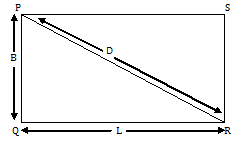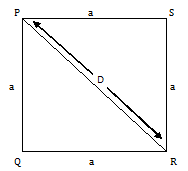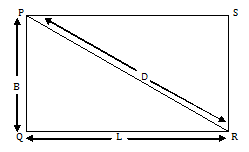CLASS-8
DIAGONALS OF RECTANGLE & SQUARE
DIAGONALS OF RECTANGLE & SQUARE
Diagonal of a Rectangle –

Let ‘D’ be the length of the diagonal PR of a rectangle PQRS, length (L) and breadth (B).
Then in the right angled triangle PQR,
PR² = PQ² + QR²
PR = √(PQ² + QR²)
= √(breadth)² + (length)² = √B² + L²
Since the diagonals of a rectangle are equal.
Diagonal of a Square –
Let ‘D’ be the length of the diagonal PR of the square PQRS. Then, in the right-angled triangle PQR

As per the Pythagoras theorem PR² = PQ² + QR²
From the above picture image PR = D, and PQ = QR = RS = PS = a
PR² = PQ² + QR²
Or, D² = a² + a² = 2a²
Or, D = √(2a²) = √2a
Since the diagonals of a square are equal,
Length of a square’s diagonal = √2 X any one side of square
There are some example are given below –
Example.) If the diagonal and length of a rectangle are 10 cm and 8 cm respectively, find its (a) breadth, (b) perimeter, and (c) area.

Ans.) Given, D = 10 cm,
and L = 8 cm
Let, breadth = B
(a) as per the Pythagoras theorem we know -
D² = B² + L²
B = √(D²- L²) = √(10²- 8²) = √(100 - 64)
= √36 = √6² = 6 cm (Ans.)